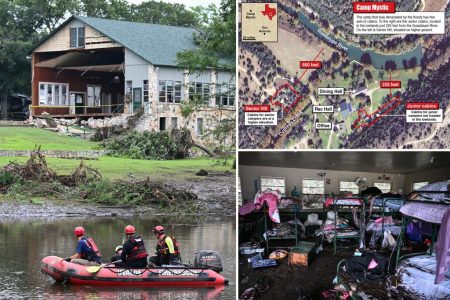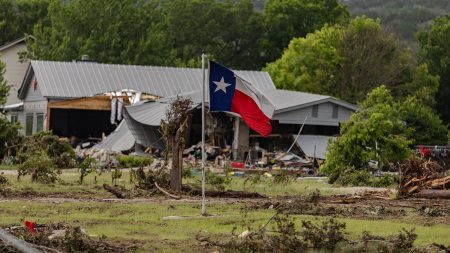Dr. Janette Nesheiwat, President-elect Donald Trump’s nominee for Surgeon General, carries a deeply personal tragedy that has shaped her life and career path. At the age of thirteen, a fateful accident in her Umatilla, Florida, home led to the death of her father, Ziad “Ben” Nesheiwat. While reaching for a pair of scissors stored in a tacklebox on a shelf above her father’s bed, she inadvertently knocked the box over, dislodging a .380 caliber handgun. The gun discharged upon impact, striking her sleeping father in the head. This tragic event, ruled an accidental shooting, profoundly impacted young Janette, fueling her ambition to pursue a career in medicine and dedicate her life to saving lives.
The incident, however, remained largely undisclosed to the public until a recent New York Times report brought it to light. While Dr. Nesheiwat’s 2017 memoir, “Beyond the Stethoscope,” poignantly describes the devastating loss of her father and its influence on her career choice, it omits the crucial detail of her involvement in the accident. The memoir’s opening sentence powerfully conveys the trauma she experienced: “When I was 13 years old I helplessly watched my dear father dying from an accident as blood was spurting everywhere. I couldn’t save his life. This was the start of my personal journey in life to become a physician.” Throughout the book, she alludes to the emotional scarring from the event, describing it as a “relentless shadow” that “unraveled the fabric of my young life.” Yet, the specific circumstances surrounding her father’s death remained unmentioned until the Times report.
This revelation adds another layer of complexity to the narrative of Dr. Nesheiwat’s life. Her decision to omit this critical detail from her memoir raises questions about the private burdens she carried and the potential impact of this undisclosed trauma on her professional trajectory. The contrast between the public persona she presented – a successful physician, a Fox News contributor, and a nominee for a prominent government position – and the private grief she harbored underscores the intricate interplay between personal tragedy and public life. It also highlights the challenges individuals face when navigating personal trauma while simultaneously striving for professional achievement.
Dr. Nesheiwat’s career reflects a commitment to practical medicine and crisis response. She has been involved in providing medical aid following natural disasters and held the position of medical director for CityMD, a network of urgent care clinics in New York and New Jersey. Her experience on the front lines of the COVID-19 pandemic in New York City further cemented her reputation as a dedicated healthcare professional. These experiences likely shaped her approach to medicine, instilling a sense of urgency and a focus on delivering immediate care to those in need. Her nomination as Surgeon General by President-elect Trump speaks to her recognized expertise and leadership in the healthcare field, particularly in times of crisis.
The Nesheiwat family’s story extends beyond Janette’s medical career. Her mother, Hayat Nesheiwat, a pediatric nurse, served as a pillar of strength for the family following her husband’s death. This maternal influence likely played a significant role in shaping Janette’s dedication to healthcare and her resilience in the face of adversity. Furthermore, the family boasts a diverse range of professional accomplishments. Julie Nesheiwat, Janette’s sister, served as a homeland security advisor to President Trump, demonstrating a shared commitment to public service within the family. Another sister, Jaclyn, ventured into the world of entertainment as a model and married Scott Stapp, the lead singer of the rock band Creed. The remaining siblings pursued careers in law, highlighting the family’s diverse talents and ambitions.
The recent revelation surrounding Dr. Nesheiwat’s involvement in her father’s death adds a new dimension to her personal narrative. It underscores the complexities of grief, the burdens of undisclosed trauma, and the challenges of balancing personal tragedy with public life. While the public awaits her response to the Times report, her story serves as a poignant reminder of the enduring impact of loss and the multifaceted nature of individual experience. As she prepares to potentially assume the role of Surgeon General, her personal history, marked by both tragedy and resilience, will undoubtedly shape her approach to public health and her leadership in addressing the nation’s healthcare challenges.











